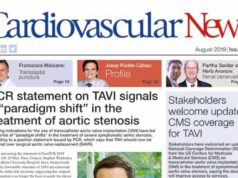
New data show that the use of the investigational HeartFlow Planner—a real-time, non-invasive interactive planning tool—led to a change in treatment strategy in 45% of patients with coronary artery disease and reduced the need for invasive physiology. The data from the BOWIE (Benefits of obtaining information for planning with non-invasive FFRCT prior to invasive evaluation) study were presented by Eric Van Belle (Lille Heart & Lung Institute, Lille, France) at EuroPCR 2019 (21-24 May, Paris, France); Van Belle was the principal investigator for BOWIE.
BOWIE is a retrospective study that included 101 patients. Three interventional cardiologists independently reviewed the diagnostic angiogram for each patient and provided a treatment recommendation. The same three interventional cardiologists then reviewed each patients’ HeartFlow Analysis and used the HeartFlow Planner to virtually explore different treatment scenarios and provide a treatment recommendation. The study compared the differences in recommended treatment plans.
For example, in one case, the interventionalists initially recommended that a lesion be treated with a 38mm stent based on the diagnostic angiogram. After reviewing different treatment options with the HeartFlow Planner, the interventionalists changed the recommendation to treat the lesion with a 15mm stent as the reduced stent length demonstrated a similar physiologic effect.
A press release reports that HeartFlow Planner is an interactive tool that enables interventional cardiologists and heart teams to modify vessels virtually, and thereby determine the optimal treatment strategy prior to an invasive procedure. Every HeartFlow Analysis case is accompanied by enough data to allow HeartFlow Planner to modify vessel narrowings and arrive at a personalised ideal anatomical model, and to allow additional computations based on altered flow rates resulting from modified vessels. With HeartFlow Planner, an interventional cardiologist or heart team can explore the treatment area and view the modified vessel and resulting FFRct changes in real time. This tool allows non-invasive study of treatment scenarios to identify which intervention is optimal. The HeartFlow Planner is currently not available for commercial use and is under review with the US Food and Drug Administration (FDA).
Campbell Rogers, chief medical officer, HeartFlow, says: “The BOWIE results highlight the potential benefit of using a real-time interactive tool prior to a revascularisation procedure as it can help inform the treatment plan, optimise completeness of revascularisation, and streamline resource utilisation in the cath lab.”











